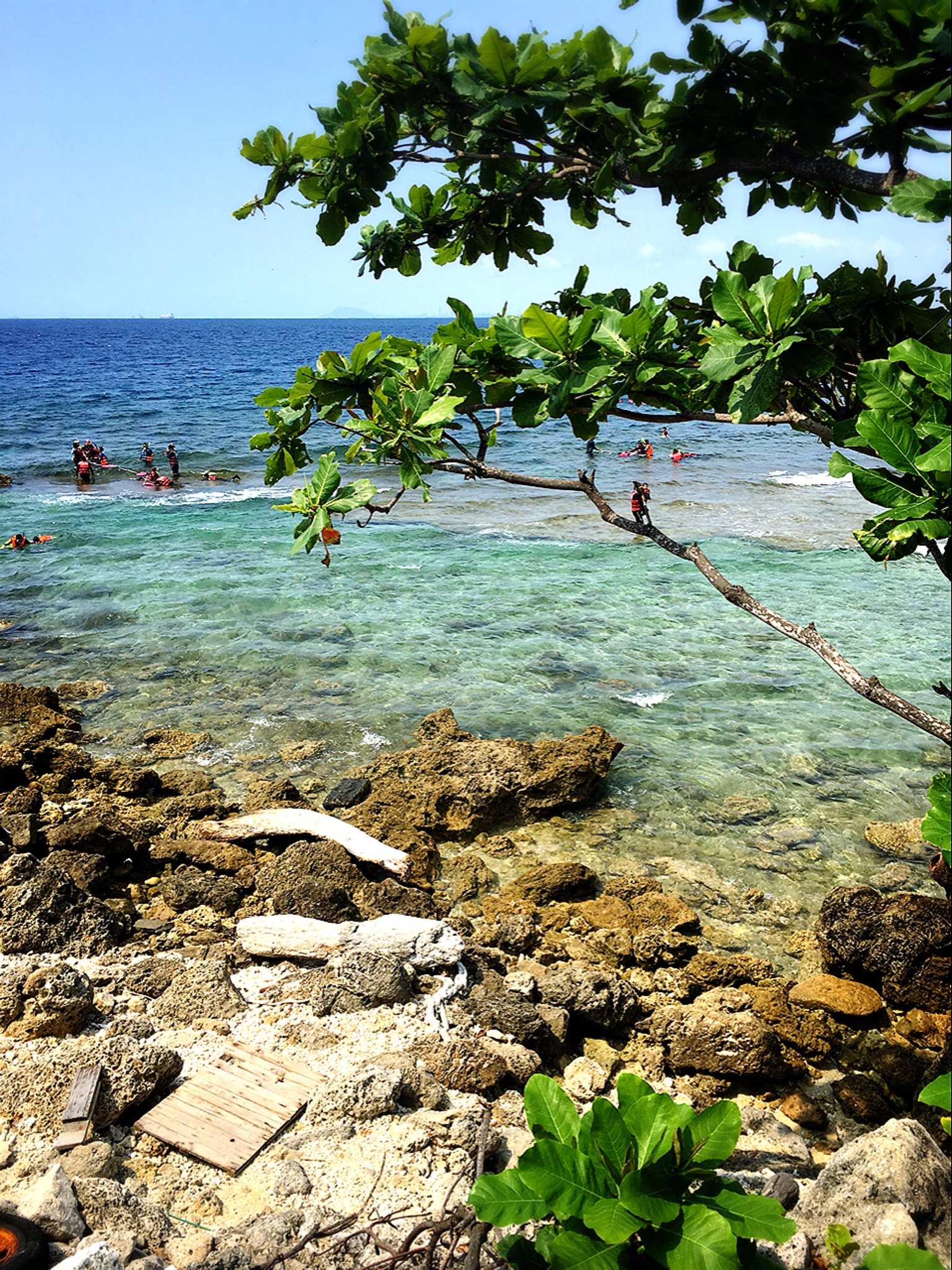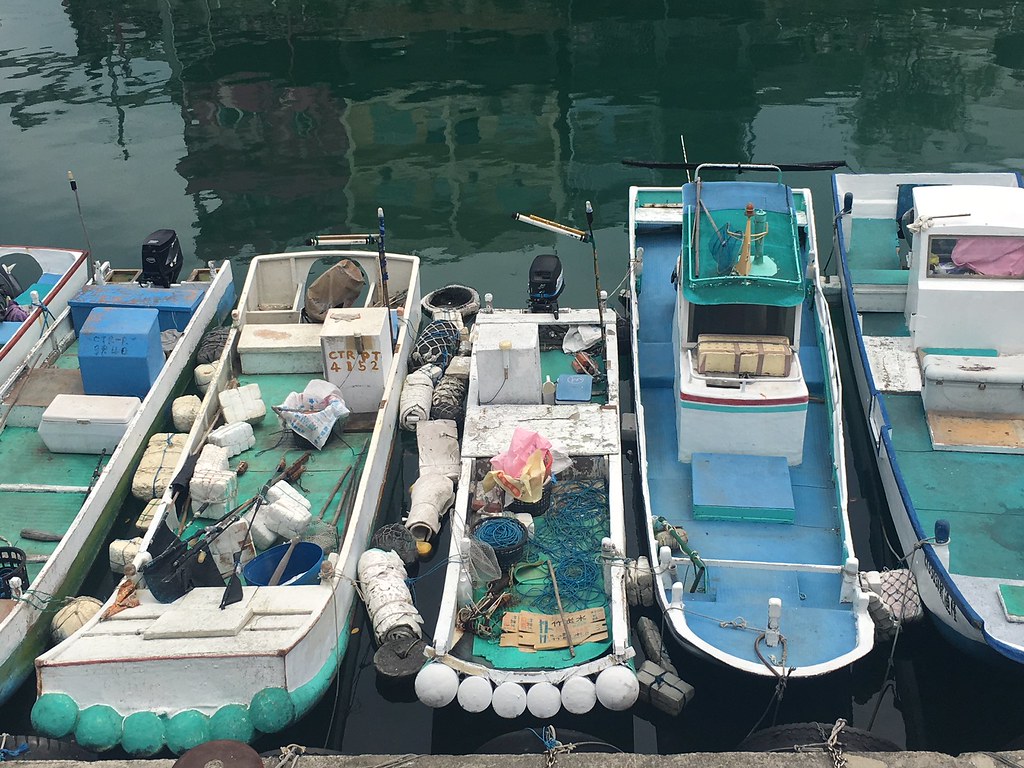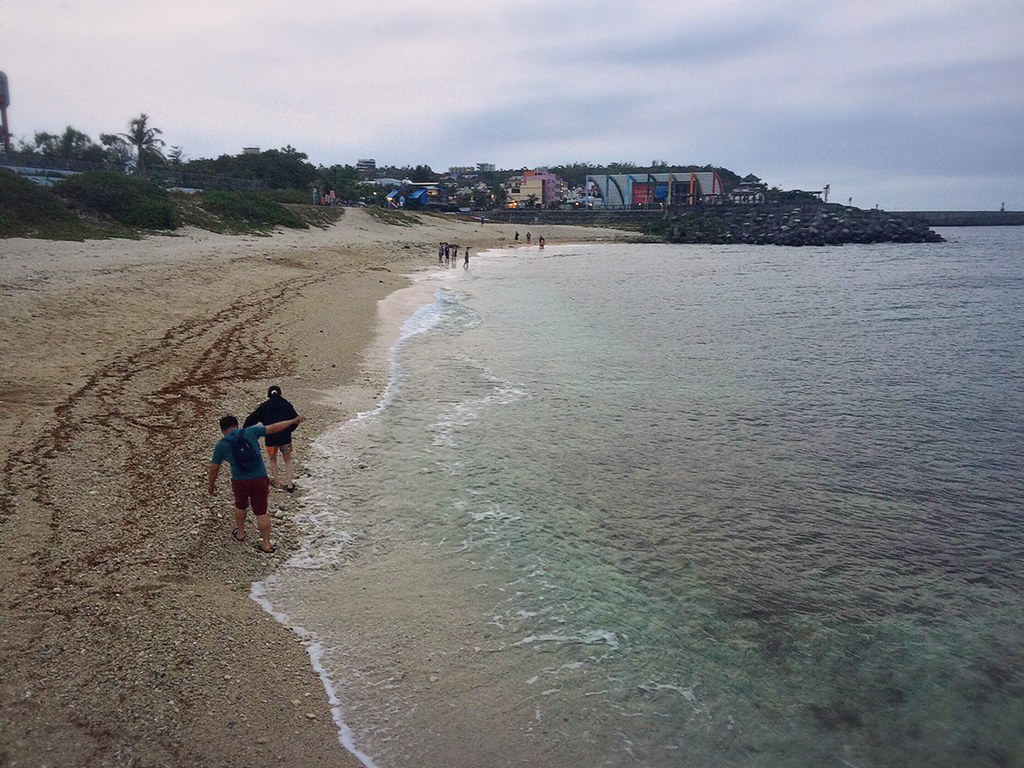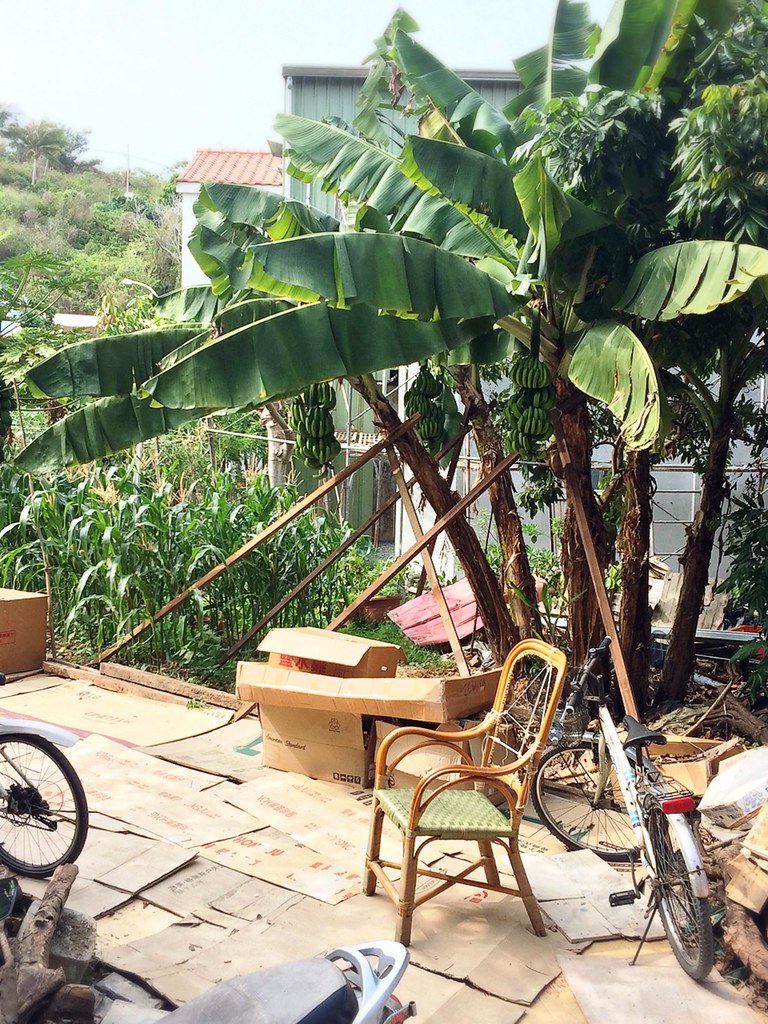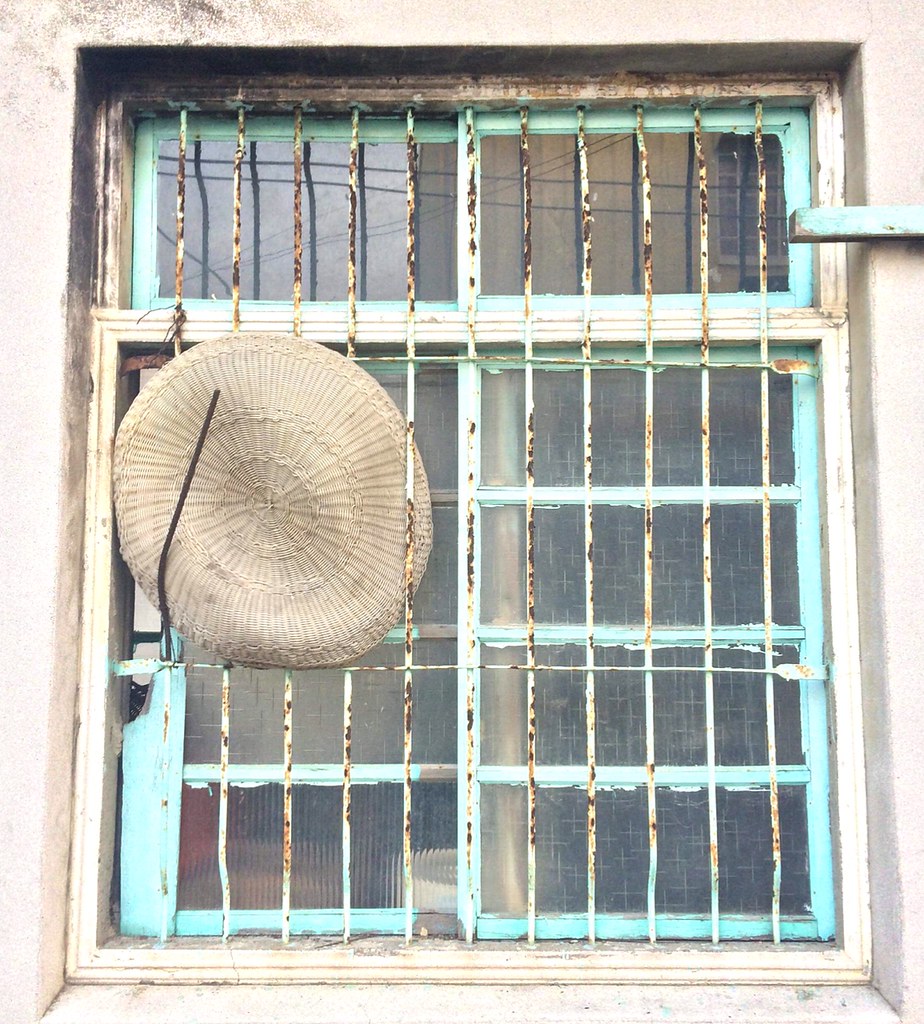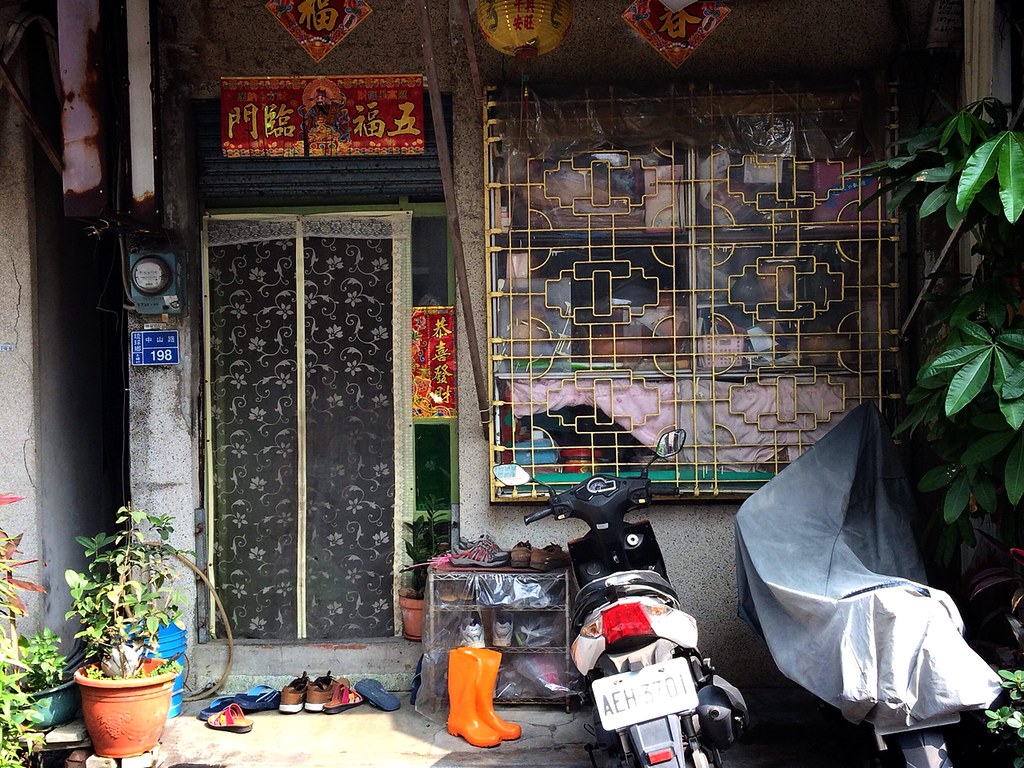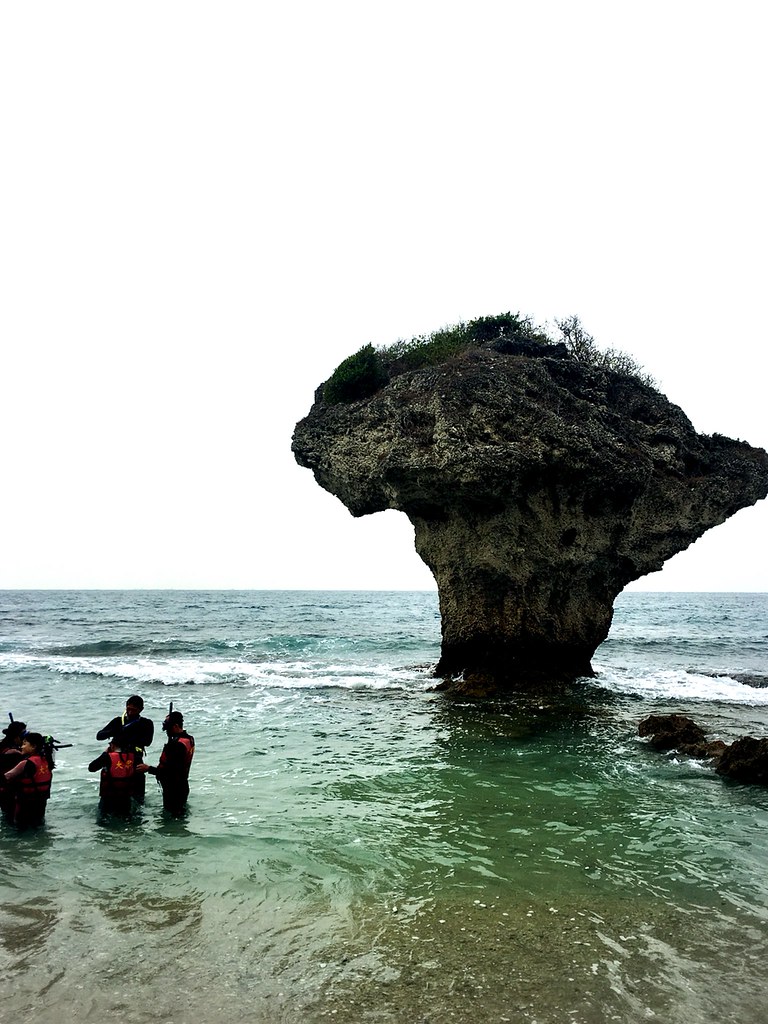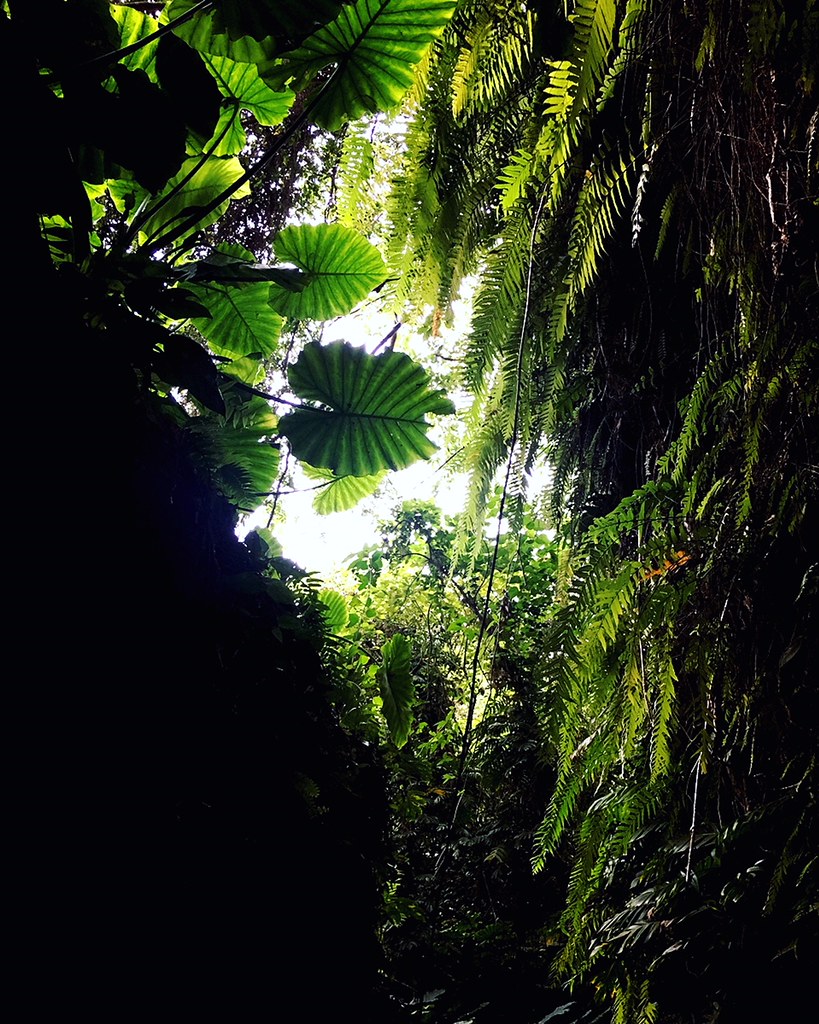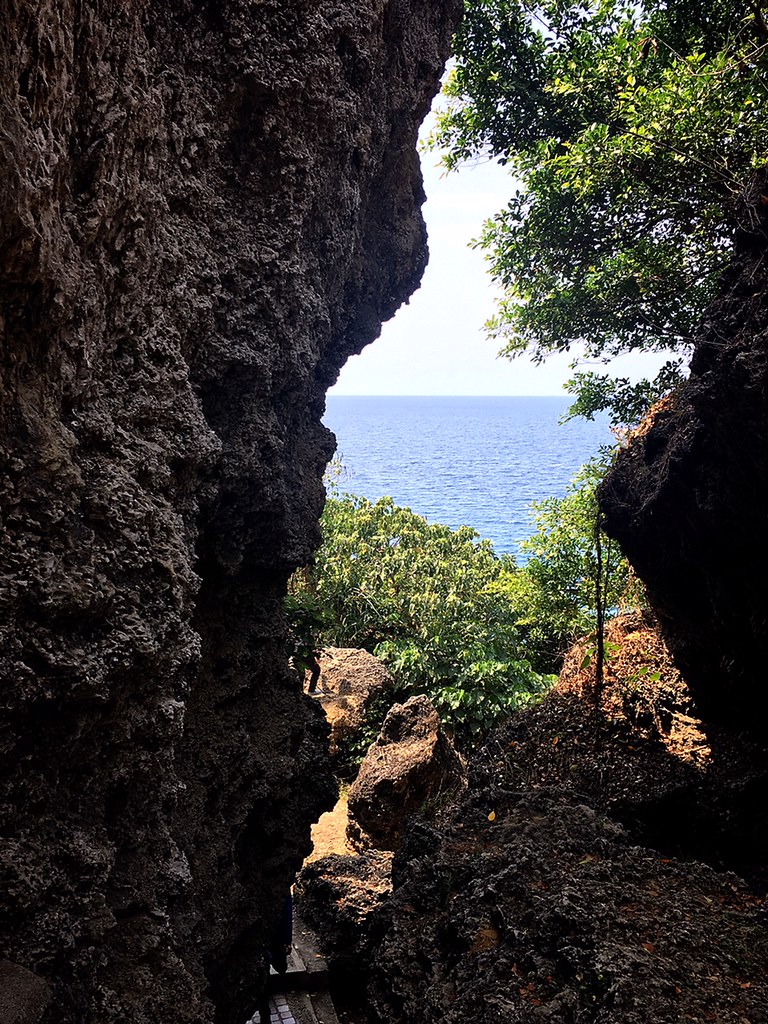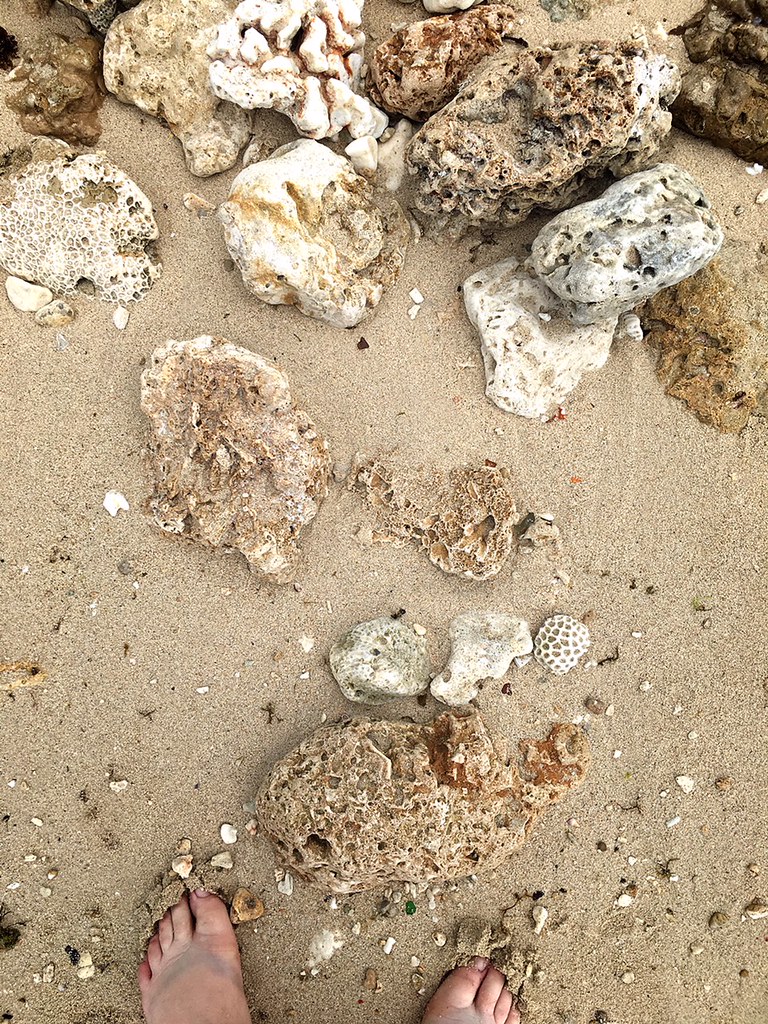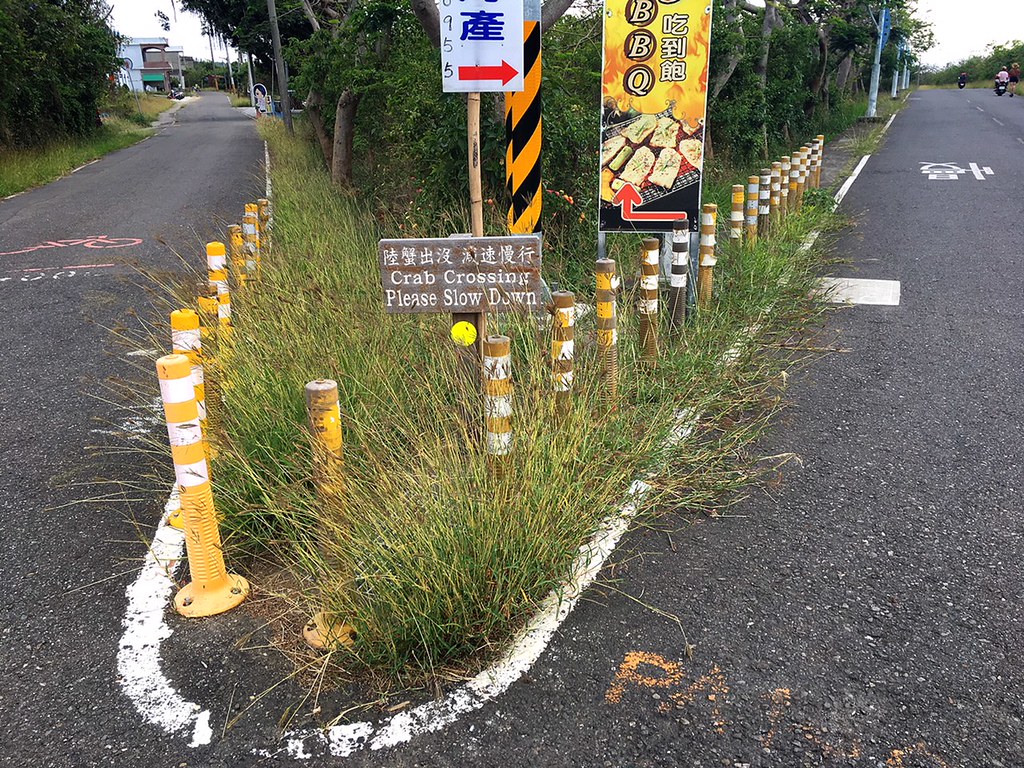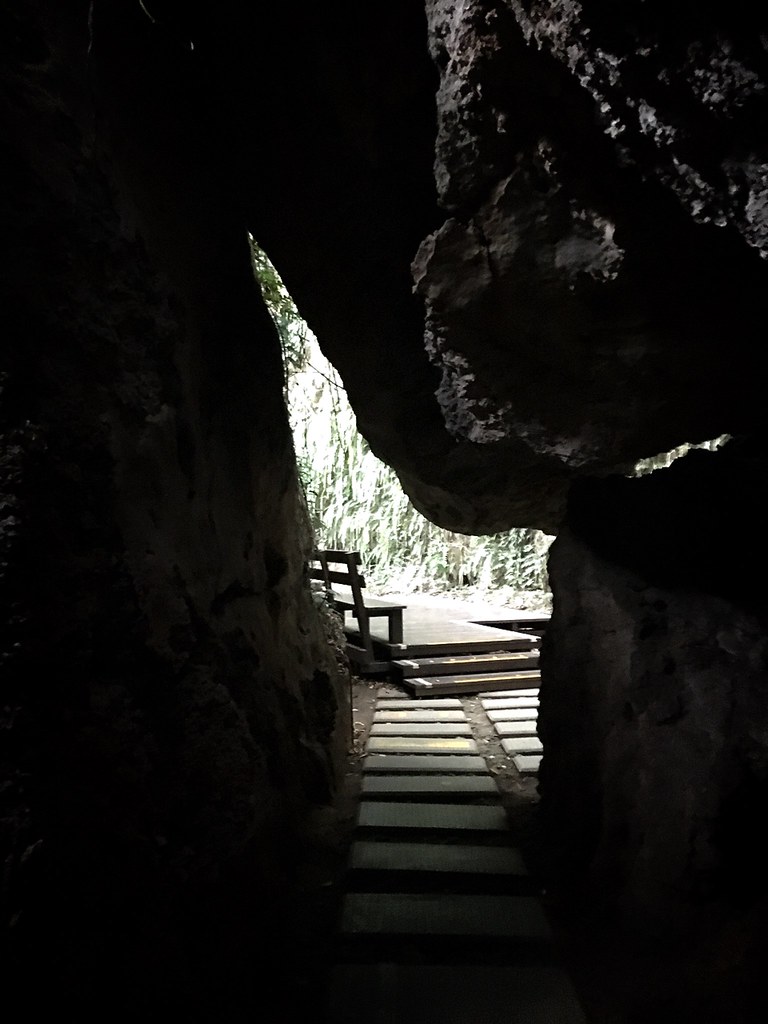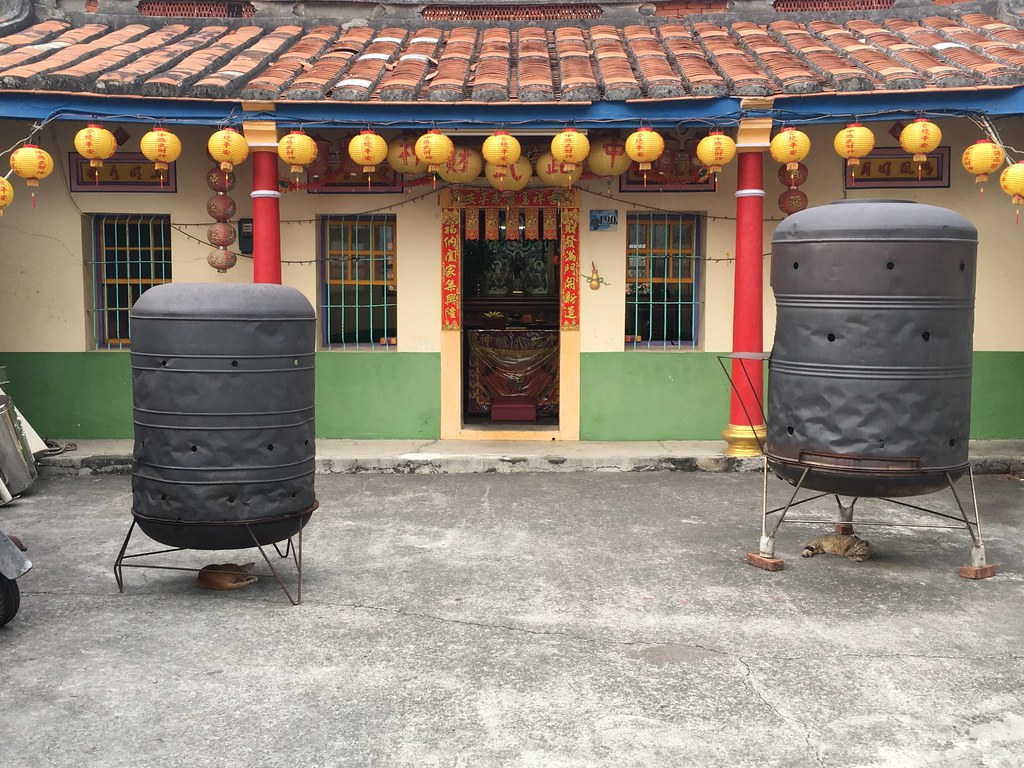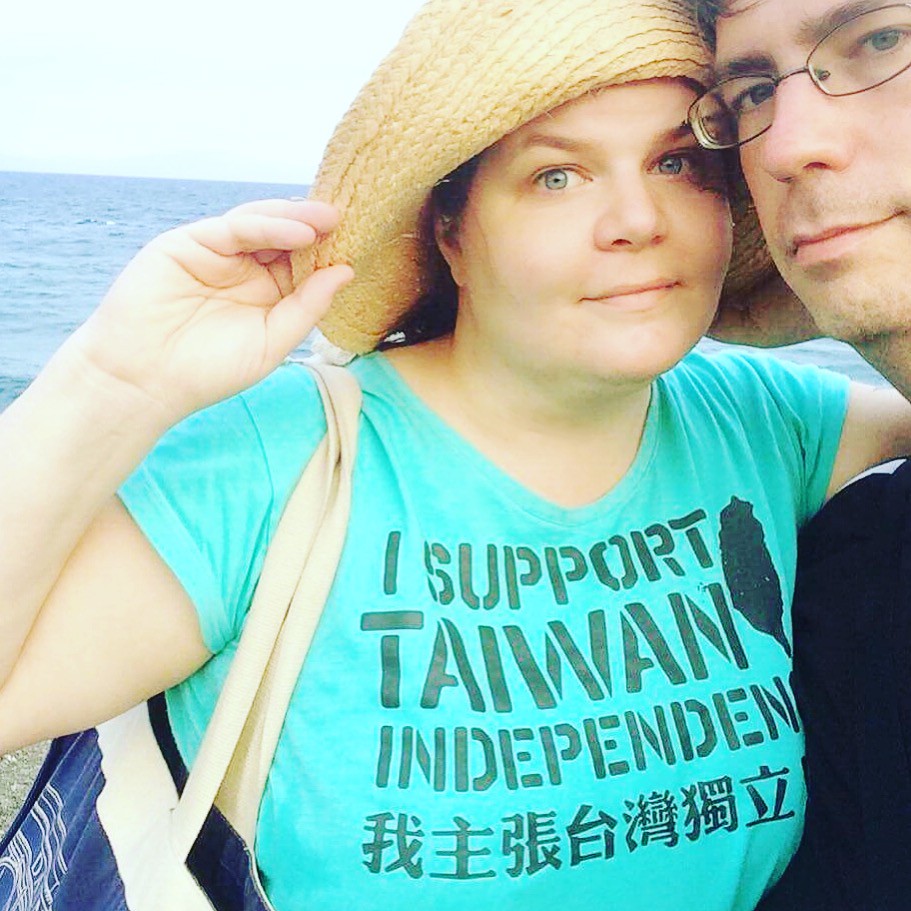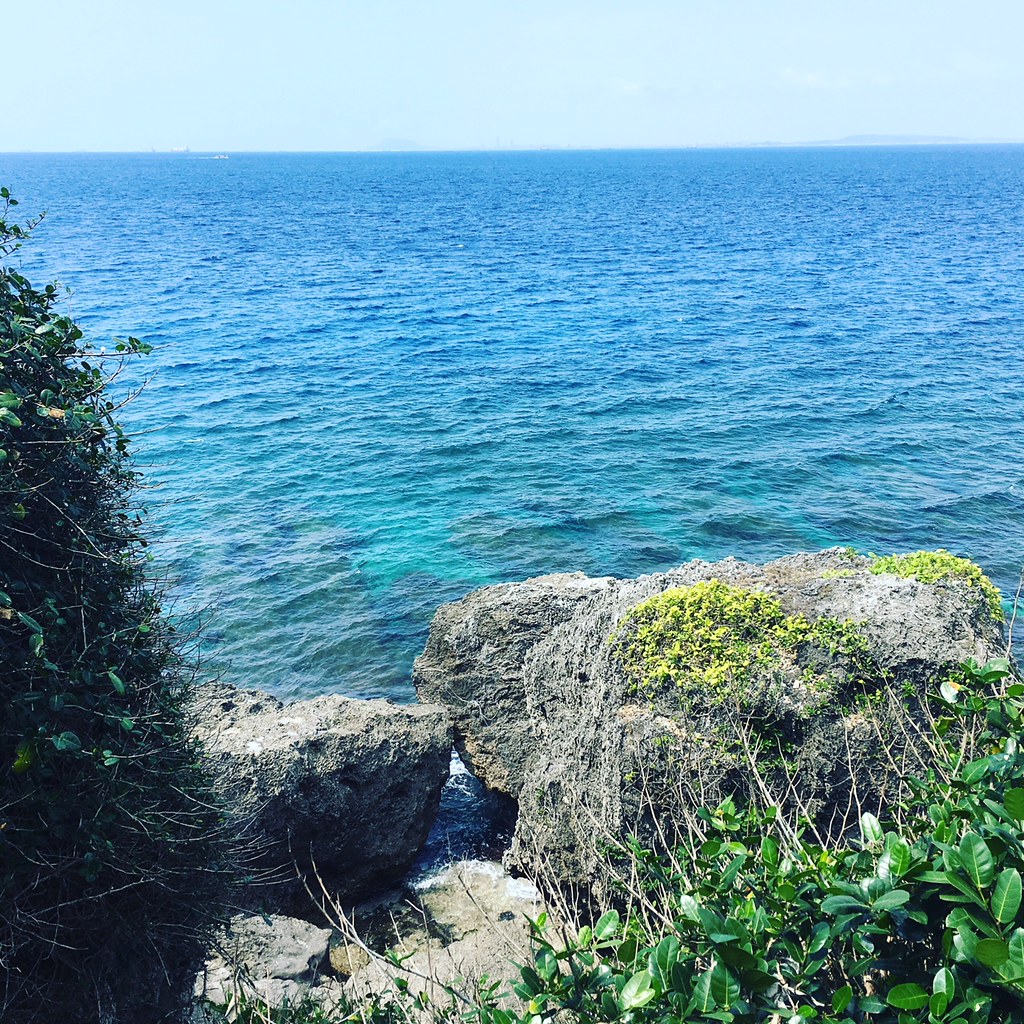|
 |
| Blogger tends to make photos that are fine on my computer look darker - you can't see it as well here, but in the original, there's a line of goats down that gray mound in the foreground staring at me. |
 |
| Flying into Orchid Island |
So this past week we spent three days total on Orchid Island (Lanyu / 蘭嶼) off the southeast coast of Taiwan. We'd planned this trip quite some time ago - you have to if you want to coordinate three people's schedules and fly in. The prop planes that fly into Lanyu seat maybe 15 people, maybe 20, so although there are several flights a day, they tend to book out. It doesn't hurt that they're cheap (NT$2600 round trip) and the ferry trip tends to induce seasickness in even the sturdiest of stomachs. I get seasick very easily - carsick and airsick too, although I rarely throw up - and really wasn't into tempting the Gods of Heaving Over The Side Or Into A Bag.
 |
Sikang Chai's shop suffered typhoon damage, but otherwise, elsewhere on the island, it was there but it seemed quite minimal.
|
We were worried at first that it was a bad time to go to Lanyu, despite our plans: typhoon damage there made the news across Taiwan, and the Community Services Center not long ago held a drive for blankets, clothes, canned goods and more to help those affected. While I would have happily gone and volunteered, I'm not exactly skilled in the things such volunteers need to be skilled in, and generally speaking well-meaning but hapless Westerners in disaster zones often don't contribute much to a relief effort (there are exceptions, of course, especially among those with the proper skills), and I didn't want it to go down that way. I also stood ready to get there and donate, our homestay owner insisted it really wasn't necessary, and when we got there it sure didn't seem it.
I figured our best bet was to make sure the island could still handle tourists - and wanted them at that particular moment (tourism is great for the economy, unless all you've got is rice, fish, taro and instant noodles and not enough of those. Then it's not so great), so I called the local police station and a homestay to ask about the situation. The police assured me it was fine, there was plenty of food and shelter, and the roads, harbor, gas station and airport would be repaired by the time we arrived. The homestay owner was ecstatic about taking our reservations, so I figured her ability to feed and shelter us was not in doubt. As such, we went: in those conditions, tourism dollars can only help.
That's not to say there was no damage. The seawall near the gas station had clearly taken a hit. It was still there, but parts of it looked worse for wear. There were a few spots along the island where landslides had obviously taken out now-repaired sections of road. There are only two main roads on Orchid Island, and one of those roads is really secondary, so the impetus is there to get the main artery cleared as soon as possible. In one area it looked like a slice of mountain had been carved off like so much birthday cake.
 |
| Hangin' |
There was some debris here and there - but it was hard to tell if it was typhoon debris or the usual "piles of stuff" you often see around Taiwan. Orchid Island is less developed than the "mainland", so if anything it'd be more prone to natural piles of stuff. At least one well-known establishment took a hit: the roof of Sikang Chai's shop and gallery was clearly patchwork-repaired, and the inside looked like it'd taken a hit.
The coral off the coast also took a hit: we did some snorkeling, but really the coral was there in patches. It was not a full living reef. Few fish and no sea snakes. The water was full of polyps, though, and you could hear the crackling sound that live coral gives off: our snorkel guide told us it would be back to normal in about 6 months. Humans kill coral at an alarming rate, but it has an amazing ability to survive and reform after a typhoon hit.
Still, we didn't see much, if anything, in the way of destroyed homes (what might have been damaged was mostly already repaired). The underground homes in Dongqing looked basically as pictures indicated they would: if they'd taken a hit, they've already been repaired. There were a bunch of smashed-up boats by the harbor, but again, it wasn't clear whether those had always been there or were the result of the typhoon. Some of them looked rather too old and derelict to be typhoon-destroyed. The airport, harbor, gas station and road - all the main stuff - was repaired by the time we got there. Food and water was plentiful, wireless Internet and the one cell tower were up, and things seemed to be basically back to normal.

Flying in was fantastic - the water out there is so clear and blue that on a calm, sunny day, you can see to the bottom across much of the expanse between Taiwan and Lanyu, and approaching Lanyu the water turns such a deep-dyed blue that it's almost blinding, like blue if blue had four dimensions. I strongly recommend it for the views alone - for the 1pm flight I'd say the left side is better, you get a bluer sea.
Flying back was terrible - typhoon Sanba is far off the coast but with no land in between us and it, gusts from it affected the weather all the way out to Lanyu, and the turbulence was stomach-curdling and, honestly, kind of terrifying (I kept telling myself that we were at a low altitude so if we went down I'd probably survive. I'd stil fly again rather than take the ferry.
The cement guardrail along much of the western side of the island seemed repaired and repainted (that white paint sure looks fresh to me), with anti-nuclear slogans already graffiti'd on. Lanyu was once a dumping point for Taiwan's nuclear waste, something the island's locals (mostly aborigines called Dawu, Yami or Tao depending on who you ask) obviously did not appreciate and have not forgotten.

The guidebooks - and other blog posts, I'm sure - can tell you all of the other basics: flying fish and taro are food staples (as is a jelly-like mushroom fungus that grows in taro fields), people here don't like their photos taken, nor photos of their houses, that the island retains a far stronger aboriginal tradition than you'll find in most of the rest of Taiwan and Yami is regularly spoken along with Chinese and some Taiwanese, that Orchid Island is relatively underdeveloped, that the snorkeling is good (except for now, it seems), that you need to rent a car or scooter to get around, or at least a bike. I won't take up this space repeating all that with details. Instead, some observations.
First, that as "less developed" as it is, kids here clearly know how to use the latest technology. Here are two young Yami (I'm using Yami because in chatting with people, they called their language "
ya mei hua" or Yami language, so I assume that's the term they prefer) kids in a coffeeshop deftly using our various smartphones to play games. The back of my iPhone is now covered in stickers they put on there. I think I'll leave them there.
Also, don't come expecting a totally undeveloped backwater. There's wifi, there's 3G at least on some of the island (Hongtou and Yuren at least). Thanks to tourism, and some local demand, it is perfectly possible to get real coffee (think lattes, flavored coffee, siphon coffee, espresso with condensed milk, sea salt coffee, and I got a millet wine coffee that was surprisingly delicious and very popular locally, according to the owner) and other amenities. A few beachside bars and cafes as you might expect in more touristy areas have popped up, mostly locally-owned. Enough that you can enjoy your beer or coffee on the coast in a comfortable spot, but not so much that it's overwhelming. They dot the island sparsely, but they are there. As a caffeine addict who can't think straight without a large mug of the stuff in the morning, this was important to know.
Just keep in mind that most spots offering such amenities, with one exception, open at 10:30am or later, and the free breakfast at most homestays will include tea but not coffee. There's one place you can go as early as 8am for coffee in Hongtou (the island's main "town") -
藍海屋 (L
an Hai Wu or Blue Ocean House) outside the southern edge of Hongtou (just keep driving past the hospital). They also offer diving and snorkeling, have a passable gravelly beach and pretty nice rooms to stay in across the road - call 0932-250-063 to inquire.
 |
| Kids playing with our smartphones at 漂流木餐廳 - a coffeeshop in the main northern hub of Hongtou. |
Another observation - while adults tended to speak with each other in Yami, some obviously Yami people communicated with each other in Mandarin. Kids often did, too - these two siblings talked with each other in Chinese as much as they did so with us. Orchid Island has about half the population of the town where Brendan grew up (a small town in Maine) - if kids are using Mandarin to communicate with each other, then as strong as aboriginal culture and tradition is on Orchid Island, I worry about the fate of the Yami language.
On the other hand, most of my local interactions felt more like two non-native but pretty fluent speakers of Chinese communicating in Chinese - rather a big change from the usual native speaker and me, a fairly fluent non-native speaker, communicating in Chinese. My friends in Taipei say that Lanyu has a local accent - well, it does, but not in the way that native speakers from different areas have accents in the same language. More in the way that non-native speakers of one language who are native speakers of another have a similar accent in the second language.
These two have a younger brother, and are all the children of the owner of the Chinese-style hole in the wall restaurant next door. I noted first that one of the workers in the cafe basically treated them like her kids (going so far as to tell the younger misbehaving one "Don't make me get angry at you!"), and that she just kicked the kid out when he was causing trouble. As in, opened the door and pushed him outside, right onto the road (the main road, such as it is, can be seen from this photo - it's hardly a dangerous highway). The kid couldn't have been older than two. He wandered off down the street - which was considered totally fine. It takes a village, I guess!
 |
| This guy's pants are on fire |
Another thing I noted is that a lot of the cafe workers in the more upscale spots didn't look Yami, they looked and talked like Taiwanese. I am sure some are local, but some might well be not locally hired or seasonal. I do hope this changes and more locals start getting such jobs - one man (who offered to marry our friend Emily) told us the same story you can hear in any rural or wayside place - forgotten by main avenues of commerce, adults grow old here and their kids go off to "Taiwan" for school and work. There's a lot of brain drain and the economy suffers. With unemployment comes alcoholism, and then others from more prosperous areas poke fun at locals for their laziness and their drinking, but small wonder why, no? This isn't unique to Orchid Island, of course, but it is why I hope we can start seeing more Yami or other locals engaged in local work. On an island so small that you can drive around it in an hour, there aren't a lot of jobs to be had.
 |
| So much gorgeous blue water, and no real beaches to speak of. A pity, or a cause for celebration? |
In that sense, I wonder if it's a blessing or a curse that Orchid Island, with its wealth of other beauty, lacks good beaches. There are places where you can swim, to be sure, but the Rough Guide's calling of one beach "fine white sand" was a joke: you get some light-colored dirt-like sand in some spots, and some darker, gravelly sand in others, but while the snorkeling may be good, this isn't a place where you go to hang out on a beach. You can sit on a balcony and enjoy, climb a mountain, get on a boat or drive around and enjoy, drive to a headland or promontory and enjoy, but you're not going to be laying out a towel and soaking up sun and sand.
And that right there is one major reason why Orchid Island is not a huge tourism draw. It's got the stunning inland scenery, the coral, the blue waters and the relative accessibility, but not the beaches. It's like the gods overlooked one crucial part of being an island paradise.

But then, if Orchid Island were dotted with fine white sand beaches like the Philippines, and then could offer it all: snorkeling, diving, boating, hiking, beaches and aboriginal culture, and it saw the major tourism numbers that Boracay or even Bohol or El Nido (in Palawan) get, would local culture disappear faster? Would catching boatmaking, catching flying fish and growing taro take a backseat or disappear altogether as locals opened beachfront cafes, sunglass shops and soul-crushing luxury resorts? Would locals prefer that (I might prefer working in a beachfront cafe to growing taro, personally)? Or worse, would outsiders snatch up good property for development, would the mountains be cut off from the beach by hotels and restaurants, would property rates skyrocket as locals are forced off their land, and would all the most profitable places be owned by non-locals, with little and less money going into the local economy?
Probably - I saw it in Boquete (local coffee farmers unable to compete with gated retirement communities for wealthy Americans), in the Philippines (although I stayed away from most of the areas where beaches were fronted by nothing but hotels), in Indonesia (all the best spots taken up by resorts that no local could afford to stay in, let alone own). Even Kenting, massively popular with expats and Taiwanese alike, is a place I don't care for, and the beach isn't even that great (it's OK, but only OK).
I'd say whether that'd be a good or bad thing would be up for locals to decide, but it seems that when one has all you need to create a hot resort destination, that locals rarely if ever get to decide anything at all.
Anyway, some more observations. I did notice that most people referred to the main island of Taiwan not as "the main island of Taiwan" or "the mainland", but rather as just "Taiwan". Nobody disputes that Orchid Island is a part of Taiwan, but in the local parlance that's not conveyed: they treat it like a separate country.
"Who can blame us?" said one local we chatted with. "They don't pay attention to us, why should we pretend to be so close to them? We are Taiwan, but they are Chinese and we aren't."
I also noticed a distinct lack of people paying for things. I mean, we paid for things, but a lot of locals sort of wandered in and out of restaurants and other places. They ate, drank and made merry, and then wandered off without paying a dime. "Local economy," my husband noted, and I think he's right. I really didn't see a lot of money changing hands between locals - any money, come to think of it, even between locals of Chinese descent and locals of aboriginal descent. We were treated to beer and snacks in several places by locals, which the person treating didn't seem to ever actually pay for. I get the feeling that the entire island is running on one extremely complex system of tabs.
I also noticed that nothing was locked - not doors, not cars. Theft is really not a problem - especially for cars. "They could steal it," my homestay owner said, "but where could they go?"
It helps that everyone seems to know each other - the grilled delicious things stand owner knew the customer who proposed to Emily. The owner of the hotel we waylaid at in Taidong knew some guy on Lanyu and told us "if you need anything ask for him - I don't have his number but just ask, he's famous". As my husband noted, "it doesn't take much to be famous on Lanyu". Someone in another town knew our homestay owner and everything about her.
Remember back when I posted about h
ow I offered an apple from my snack stash to the Atayal owner of a homestay I like in Hsinchu County? And how it was a bit of culture shock that she just took the apple an clearly wanted it (and didn't try to hide that) without the usual three refusals and two thank you's, or whatever is deemed necessary in Chinese culture?
Well, something I noticed on Orchid Island is how much more frank people are about certain things. Like, well, how our friend Emily got four (five?) marriage proposals in three days, and I am pretty sure at least a few of them were serious. Nobody harassed us - although one half-cut guy on a sitting platform in Dongqing got a bit too touchy so we had to leave - but upon learning that Emily was single, plenty of guys were totally willing to change her relationship status. Even if they were joking (which I am sure many of them were) the jokes were more frank, more ribald, more "hey baby" than I ever hear in Taiwan,
where it might take a guy several months to even express indirectly that he likes you.
At one restaurant - Chinese style but Yami-owned - we were being treated to beer. It was maybe 11am but whatever. We ordered some tea eggs with our noodles, but the people who invited us to sit with them still had a bunch of quartered tea eggs on their table. “你可以吃,沒關係,不用客氣,隨便啦” ("go ahead and have some, don't be shy") one guy said. The
laobanniang (owner, who was female) said "哈哈,妳可以吃他的蛋!" ("Haha, you can eat his eggs!"). It was a fairly mild joke by modern standards, but to three new foreign customers, from a woman, without hesitation, it was quite different from what I've grown accustomed to in Taiwan.

Finally, I noted that drinking and driving isn't the social sin it is in Taiwan. Not that I ever do so - I don't even drive much, but if I did I wouldn't drink - but here it's perfectly normal to down a few beers or even half a bottle of rice wine, and then get on your scooter and drive home. Without a helmet. It helps that there's only one road. You won't face much danger from traffic turning in ahead of you, but still, I wouldn't really say it's safe to do this, but nobody seemed to think much of it. The owner of the "grilled delicious things" place we ate at in Yeyou made sure Emily was good to drive (she had had some Taiwan beer, but stopped early and we felt she was OK to drive), but otherwise it didn't raise the eyebrows it would in Taiwan proper, where my Taiwanese friends are even more circumspect about drinking and driving than my American ones (and my American ones are all pretty careful).

Finally, one thing I really felt was that the culture here was not only not very Taiwanese, but that it reminded me far more of my time in the Philippines than Taiwan. The blue waters, the language I don't speak (although I can now say "cheers" and "thank you" in Yami -
milum and
ey-OY respectively), the flora and fauna, the slow pace of local island living, the grilled seafood, the more Austronesian/Pacific Islander culture rather than Chinese cultural influence, the more lax social norms. If anything Orchid Island is more Filipino than it is Taiwanese - but really, all that aside, it's just plain unique.
 |
| Delicious grilled things - flying fish, pork and more. |
I might come back and add some more observations, but that's it for now. For the rest of the post, I'm going to make some recommendations.
First, you can see my recommendations above for coffee. For food, The Epicurean Cafe (mentioned in Rough Guide) really is great, but it's not where the Rough guide Map says it is. There's a road going up and then along a hill parallel to the main road on the north end of Hongtou - it's along the flat portion of that road, not the main road.
Otherwise, in Yeyou, just as the road turns there's a fairly innocuous restaurant with some outdoor seats advertising flying fish in Chinese. Across the street is a more sizeable restaurant advertising draft Taiwan beer. The grilled stuff restaraunt
will change your life it is so good. We got pork, squid, flying fish, stinky tofu and chicken and it was all ridiculously good (we ended up getting two flying fish, ahd the chicken was amazing). That and a pitcher of draft beer from across the street is a great way to finish the day. Locals hang out here - you can chat with them fairly easily if you make this your dinner stop.
Blue Ocean House (above) offers standard Taipei cafe fare, but it was pretty good as cafe food goes. If you want some easy comfort food this is your place. Also, great patio out back.
The "small eats" restaurant in Hongtou near Lanyu Local Hotel (蘭與民宿) is open past the regular lunchtime when everything else closes and serves basic Chinese fare. A good choice if you were out driving too late past lunchtime and need some food, or need something quick before heading to the airport or harbor.
 |
| From the weather station at the top of the mountain road |
Second, you could rent a car or scooter - renting a scooter means it'll be harder to get up the mountain road (I wouldn't want to do that on a scooter), but possible to get up to the lighthouse for sunset, and you are closer to the environment around you than you would be in a car. I definitely recommend going up to the lighthouse if you can (we couldn't).
If you can't or you're running late - leave at around 4:30pm from Hongtou if you want to see the sunset at the lighthouse - the smaller watchtower behind the gas station, near the harbor, is a good place to enjoy the sun going down. You can drive there and walk up the easy steps.
Definitely make the drive up to the weather station. There are some great panoramas up here, a picnic spot, an aboriginal-style stilted lounge area, a cool abandoned building and windy, gorgeous views.
 |
| Abandoned building at the weather station |
 |
| An ideal picnic spot at the weather station |
 |
| Dongqing Night Market...such as it is |
The caves on the north coast don't sound like much, but they're worth a stop for a few good photos, if photos from caves are your thing. The photos in my last post of cave mouths were taken here. Definitely worthwhile is Dragon's Head Rock (above) - in fact, one of the best parts of visiting is to just drive or scooter around the island stopping where you like to take photos or enjoy the view.
 |
| Set meal at The Epicurean Cafe, which serves aboriginal-influenced local fare. |
The Epicurean is a good place to hang out after hours for drinks - they make some drinks pretty well although their gin is quite rough (according to Emily). They close at 11, but are walkable to many hotels in Hongtou. Or you could continue the party at the bar/cafe across the street from the local hospital in central Hongtou (Hongtou is quite spread out down the main road). No ocean views but open late and a nice vibe, although we didn't go in.
You could go after you drive out to a viewing platform or to Dragon's Head Rock - or farther - to enjoy the stars. Definitely make time to do that - Lanyu's starry skies are really a sight to behold, with the Milky Way shining clearly across the sky.
We stayed at the
Lanyu Local Hotel (蘭與民宿 in Rough Guide, 海波浪民宿 on their business cards - 089-732669) and would recommend it. The owner is from Taichung. She's very friendly, can arrange short (like 1.5 hour) snorkeling trips and boat trips if the weather is good. Breakfast, wifi, computer use and downstairs TV privileges for those who stay. Beds are Taiwanese-style on the floor beds and are quite firm, but clean and the rooms are spotless and air conditioned. Bathrooms are shared.
 |
| Caves on the north coast |
 |
| Anti-nuclear power signs |
 |
| Boats - damaged by time or the typhoon: it's unclear |
I would also definitely recommend snorkeling while here. If you've never done it before, don't worry - you can arrange for someone to take you out and show you where to go and guide you as you both hang on to a life preserver. I enjoy snorkeling on my own, but this was fine as we only had one other person in our group (a Taiwanese woman - Brendan couldn't join us due to his injuries). If it's a large group, try to arrange to go out on your own at some point as so many snorkelers in one place, with their hands, feet and bodies all around you, does tend to ruin the experience.
 |
| Making a new boat |
 |
| Driving around Orchid Island is one of the best parts of the trip |
All in all I can say that I really enjoyed the trip - it was one of the most rewarding trips I've taken in Taiwan. I've done all there is to "do" on Lanyu except for possibly more hiking and snorkeling (two things we had to either do in moderation or skip altogether due to Brendan's injuries), but I'd go back just to relax and show friends around. If you're looking for a good getaway in Taiwan and want something different without going abroad, Orchid Island is just the place.
